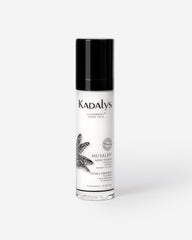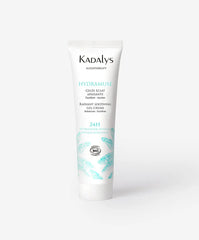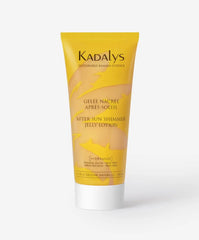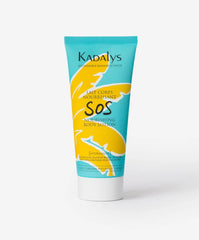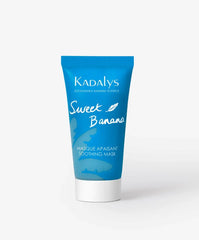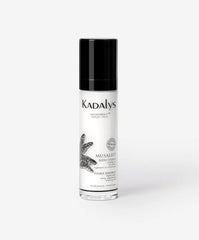
Blue light and skin aging: what effects on the skin?
Everyone has heard about blue light and its harmful effects on the eyes, but also on sleep and potentially on mood. We often blame all kinds of screens (computer, tablet, television, telephone) but did you know that in reality blue light is everywhere? It is also found in LED lighting and ... in the sun! More vicious than UVA and UVB, it acts on our skin slowly by slowing down the production of collagen and elastin, two proteins that are essential for skin firmness. Blue light thus joins the already long list of external elements that cause premature aging of the skin. Today, we explain everything about blue light and help you protect yourself from it!
What is blue light?
Blue light is part of the light visible to our eyes. It represents about one third of the light that our eyes receive. It is a very energetic light, even if it is less energetic than UV light (A and B). This high energy makes it a concern for the eyes because it could alter the quality of our retina, the part of the eye that creates vision, but it is also a concern for the skin. Blue light does not heat the skin, it acts without causing any particular discomfort unlike UV. No danger signal is received by the skin or the brain and yet the harmful effects do occur. Some studies have even shown that this type of light could have effects as harmful to the skin as tobacco or pollution. When you know that blue light is found just about everywhere and that we spend an average of 6 hours a day on screens, you can understand what is at stake. However, blue light, used at low energy in an institute or at a dermatologist's, can have positive effects on the skin. In low doses, it can have a positive effect on the improvement of skin healing, mycosis (of the skin and nails), acne and can even have an anti-microbial action! As with many things, there is good and bad.
Does blue light accelerate skin aging?
By acting slowly on collagen and elastin production, blue light can have an effect on skin aging. In addition to that, it also tends to alter the state of our cell capital located on the epidermis by causing oxidative stress. Normally, our skin contains free radicals, unstable molecules synthesized in our cells in reaction with oxygen. These molecules, when present in normal quantities, allow our cells to defend themselves from external aggressions. However, when there are too many of them, they have the opposite effect and cause oxidation of the cells, the skin is damaged and weakened, this is called oxidative stress. It can be caused by too much or unprotected sun exposure, a lack of hygiene (diet, skin care), alcohol, tobacco, pollution and blue light. So yes, a small amount of each of these elements will not have any visible negative effects in the minute but in the long term, they can be fatal. Pigment spots, fine lines and wrinkles and a dull complexion are all possible consequences if no skin protection is put in place.
Secondary adverse effects of blue light on the skin
Apart from accelerated skin aging, other adverse effects on the skin can be observed. Some studies have shown that blue light can also act in a more visible way by creating more skin pigmentation on phototypes type 3 and above. Phototypes are "categories" of skin ranging from 0, a very fair-skinned person (albino), to 6, a dark-skinned person. To determine a person's phototype, we use four elements determined by melanin:
- hair color
- skin color
- the way the skin tans (tanned, sunburned then tanned, ...)
- how often the person gets sunburned.
We can therefore observe a more important pigmentation of the skin on certain parts of the face because of the blue light. These pigmentation spots can resemble a pregnancy mask and generally do not last more than three months if suitable day creams are used. Blue light is also responsible for a dull and uneven complexion because it oxidizes skin cells. This oxidation can also lead to imperfections and a general skin beauty at half-mast ... Apart from the effects on the skin, we also notice sleep problems, a serious alteration of vision for people who are in front of screens without glasses and in a prolonged manner, and mood changes.
How to slow down the effects and protect your skin?
One of the first things to do to slow down skin aging is to think about protecting your skin every day, either with a sunscreen or with a cream that has an SPF rating. It is often mistakenly thought that sun creams are only important in summer and this is not true! Even in winter the sun's rays have an effect on the skin. So yes, sunburns are unlikely, depending on where you live of course, but the effects on the skin are not in pause mode! To slow down the effects of blue light on the skin, it is also recommended to use creams rich in active ingredients with proven protective and blocking action against blue light rays, such as our Face and Bust Shield Care. Its natural formula contains anti blue light active ingredients: a complex with clinically proven effectiveness composed of Red and Black Camargue Rice, organic and non-GMO Soybean Oil). Also think about creams enriched with active ingredients with antioxidant properties. Superfruits, vitamins, essential oils or vegetable oils, everything is good to boost our skin and slow down the aging of our cells. To fill up on antioxidants, think about eating colorful foods too! Peppers, tomatoes, oranges, melons, carrots, cabbage, spinach, etc. Fill up on vitamins. To protect the skin, think of putting your screens in night mode at the end of the day or reducing their brightness to the maximum. Be careful not to have your screens completely black, as this could damage your eyes! You should know that on some screens, you can even activate an anti-blue light filter or put one on the screen.

If despite your best efforts you are prone to pigment spots, whether due to UV or blue light, consider adding an anti-spot serum to your beauty routine!







